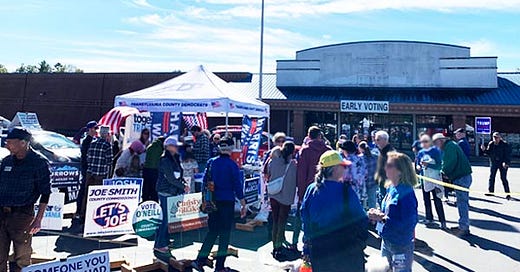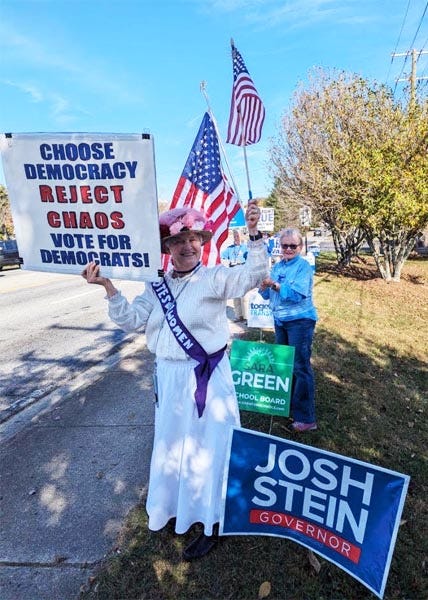One Thing You Can Be Sure Of ...
... you're not alone in this time of turmoil, and 6 community leaders tell how they're coping
Last week my doctor said my high blood pressure is situational, and most likely short term. Then she added, “After November 5th, we’ll see if we need to look at long term.” (In case you don’t know me, she meant if Kamala doesn’t win.)
As the election nears, we seem to be meeting one another on a social battlefield. In public places we look for differences and try to figure out if we’re among friends. Everyone’s stressed by social media disinformation and newspaper headlines. And with reason; our way of life is on the ballot.
But what can one do about this anxiety?
I asked six of our community leaders how they’re coping, and they generously shared their responses for this post.
Historian, professor, lecturer and author
Dan Carter is a lifelong student of politics and history. He recognized my apprehension. He agreed,
There’s no modern precedent for the challenge to our democratic republic and to our future (think global warming) that Donald Trump poses. Polls can’t predict an outcome, but it bewilders me that they’ve shown a slight shift toward Trump despite his recent bizarre and dangerous comments.
For me, coping means a combination of continued activism and brief periods of escape in daily activities that amount to a kind of “yoga” dissociation. I work for our local Democratic Party and for Transylvania Partners for Democracy. I try to listen to people who support the opposition, and make my case with civility, and I write to people I know who are still undecided.
There are always house and garden chores that allow me to quiet my restless mind. And I try to remind myself that however threatening our times, we must focus on things that bind us together: supporting groups that help people recover from Helene’, paying close attention to our friends here and elsewhere.
That may not be much solace, but in a storm, you grab for any life preserver in reach.
Reverend and retreat leader
Reverend Bill Livingston is an Episcopal priest who served in and consulted after natural disasters and has published on post-disaster emotional and spiritual recovery, and has guided clergy on emotional and spiritual wellbeing in stressful times. He told me,
I’m seeing a lot of similar emotional reactions to this election that I've seen after natural disasters. I’ll state my approach in the form of bullet points.
● Anxiety, fear, anger, grief, depression, exhaustion, and more, are normal responses to trauma. Yes, this election is a trauma. The stress is in fear of the worst, but also of the unknown. It doesn’t help to focus on an extremely good or bad outcome. Instead, recognize that your emotions are normal; then focus on dealing with the ambiguity. If overwhelmed, take breaks from the news, polls and non-stop political conversations. Find healthy diversions which have sustained you in the past. Save energy for the election outcome.
● If the election goes as you desire, slow down. Don’t gloat over those who “lost”. Focus on gratitude more than on having “won”.
● If the election does not go as you wanted, let your emotions be guided by reality and not by panic. When you feel overwhelmed, step back. Find healthy ways to express painful feelings. Turn anger into creativity instead of venting it politically or toward a loved one. Cope daily with anxiety or stress with yoga, hiking, praying, or what has helped you in the past. If sad, connect with those who bring you joy.
● If the election happens to be the worst possible, which it probably won’t, identify “the new normal” - its good and bad points, and what good parts of the past still apply. Stay resilient by not trying to make everything like it used to be. Ask, how can “the new normal” be redirected, and how can you work on this with others? Self-care is essential - “just be”. Support each other.
● Choose constructive reactions. It’s ok to feel sad, but not to have 8 drinks a night because you feel sad. It’s ok to be angry, but not to scream at your spouse or a child or at someone who thinks different politically. Depression is a normal response, but if you’re not sleeping, eating or avoiding others, you need to talk to a therapist.
● Finally, a quote: “We do not have the power to stop or slow the transitions that we encounter, but we can live through it and help one another.…” Today is a new day and a gift.
Former Leader of Planned Parenthood Global’s Latin American Region
Dee Redwine tells me,
I’ve been putting energy into doing all I can to help democracy and the rule of law in the United States prevail, while also not letting this election and its potential outcome completely colonize my brain and soul.
To be informed but not overwhelmed, I limit my news to NPR once a day, to The Atlantic for more in-depth content, and every few days to FoxNews headlines (no clicks!) to help me understand the info-verse that so many others are functioning in while we rant and rage among ourselves.
I remind myself that the U. S. in fact is not the center of the universe, and there are other events in the world, both good and bad. For this, I lean on BBC, The Guardian, LeMonde and other global sources. I follow David Byrne’s “Reasons To Be Cheerful Newsletter”, world-wide stories of hope.
Lastly, I turn to nature. The forest and plants and bugs and clouds and moon save me. I imagine myself zooming up into space and looking at our little planet, and think about all the human follies and the outsize importance we give to them in our day-to-day lives. We are, in fact, not so important. I take deep breaths and know that the earth will go on and be fine.
Meanwhile, though, I’m phone banking like crazy!
Community leader, U. S. Department of Defense retiree, and former Brevard City Councilman
I asked Rodney Locks how to be informed but not overwhelmed. He said,
Vote early and avoid the chaos to come.
And, how to find equilibrium in a stressful time? He combined two constructive actions:
Vote early and share your experience.
Feminist theologian, Episcopal priest and author
Reverend Carter Heyward has been a political activist throughout her life. About the stress of today’s politics, she told me,
I’ve found myself humming “A Cockeyed Optimist” from South Pacific! These days I hum and sing a lot to my dogs as we walk through the woods. It’s one of my ways of coping.
I just read Ruth Marcus’ advice to turn off most cable news, even if we admire and learn from some commentators; and to avoid polls. I don’t think pollsters are capturing the women’s vote (think 2022) or the youth, black, brown or “hidden” (private, none of your business) votes, or the votes of Republicans and Independents who’d rather eat nails than vote for Trump or talk to a pollster.
I believe Kamala is being underestimated. Far-right groups skew the polls to the right to upset us — and to give their man leverage to deny the legitimacy of an election he’s going to lose.
I don’t believe most Americans in WI, MI, PA, NB, GA, AZ, and NC are going to vote to put a hateful sleazebag fascist and his troops in charge of our country. I accept that it will be close, but we’ll do okay — hopefully locally, at state level, and nationally.
Meanwhile I lean on friends, read mysteries, enjoy music, write, help with Moral Monday, and am a poll observer. I’m hosting Asheville friends who needed a place to stay for a while. And I eat hard candy and ice cream with nuts!
I take heart in Julian of Norwich’s words: “All will be well, and all manner of things will be well.” Regardless, I’ll keep on keeping on— and will be together with friends and colleagues like each of you.
Professor of Education and Director of Teacher Education at Brevard College, and Fulbright Scholar
Betsy Burrows encourages her students to pay attention to events and makes sure they know that they can influence what happens in their lives. “As a teacher,” Betsy told me,
one of my responsibilities to the young people in my classes is to present hope for our collective future, even when I am worried, and I am worried about this election and the future of our country.
I often turn to poetry and to nature to keep me calm and hopeful, and this is the poem "The Peace of Wild Things" by farmer and poet Wendell Berry, that I have been turning to in the last few months:
When despair for the world grows in me
and I wake in the night at the least sound
in fear of what my life and my children’s lives may be,
I go and lie down where the wood drake
rests in his beauty on the water, and the great heron feeds.
I come into the peace of wild things
who do not tax their lives with forethought
of grief. I come into the presence of still water.
And I feel above me the day-blind stars
waiting with their light. For a time
I rest in the grace of the world, and am free.
All my thanks to those who contributed to this post.
Now I invite you to comment, too, because together we can not only successfully weather what will be, we can also work to define it.







I read Robert Hubbell's intelligent emails everyday and take heart in his positive words.
Thank you, Deda! I badly needed the advice of these wise folks!